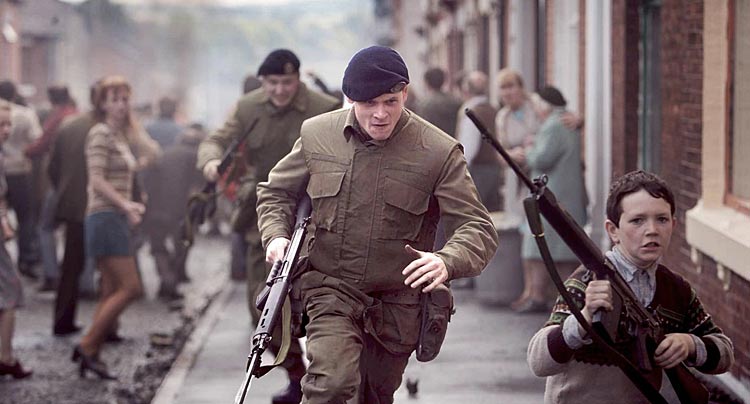
A distinctive film from Yann Demange; undoubtedly one of the best British thrillers of the year.

A distinctive film from Yann Demange; undoubtedly one of the best British thrillers of the year.
‘71, named after the year in which it is based, is director Yann Demange’s striking début feature, which follows a British soldier left abandoned in the middle of Belfast at the height of the conflict in Northern Ireland.
The film is told from the perspective of Gary Hook (Jack O’Connell), a brand new recruit in the British Army, who is sent to Northern Ireland after barely having time to finish his basic training. Cook is clearly not the only soldier out of his depth, as his commander makes the perilous mistake of sending his troops into the middle of a riotous Belfast, without protective gear. When the British Army arrive in the heart of the Republican part of Belfast there is an immediate hostility towards them. An encounter between the British troops and a mob of protesters quickly becomes violent and the resulting skirmish leads to Hook being separated from the rest of the British Army and subsequently trapped behind enemy lines.
Quickly becoming apparent in the opening scenes of the film, Demange is reluctant to let ‘71 become bogged down in the complexity of political context to the conflict. Rather than explore the Republican’s motivations for seeking independence for Northern Ireland, or the Protestants opposing arguments, we are instead thrust straight into the heart of the conflict. This may frustrate political ‘anoraks’, but it gives the film a sense of urgency that propels it forward with a compelling frenetic energy.
After being dropped behind enemy lines, Cook is trapped like a rat in a maze as a group of menacing young IRA soldiers drive around searching for him, as well as a group of British undercover officers, whose true loyalties are ambiguous. As with all great thrillers ‘71 is at times unbearably, painfully tense. This is due to fantastic performances throughout the cast, but especially from Jack’ O’Connell, who is in a terrific run of form at the moment after his mesmerizing performance in Starred Up. The cinematography is also excellent as Tat Radcliffe (who unsurprisingly worked on BBC’s dark and stylish The Shadow Line) gets the maximum amount of drama and suspense out of Belfast’s narrow, dark, cobbled streets; dusty, smoked filled pubs; and imposing apartment blocks. Added to ‘71’s dramatic cinematography is a pulse-pounding soundtrack to ratchet up the tension.

Demange strives to convey those caught within the conflict as ordinary people simply trying to survive. One of the effects of the film in following a single soldier and one who appears seemingly apolitical, is to convey the chaos and the senselessness of the violence on both sides of the conflict. There are some particularly provocative scenes in the film, juxtaposing the speed with which shocking violence can occur, arising out of seemingly ordinary and familiar situations which will undoubtedly stay with the audience. Occasionally, Demanges’ naturalism can come across as a little contrived but this is rare with the director more often than not delicately balancing nuanced performances from his actors with all the thrills that you would expect from a genre film.
With ‘71 Demange has created a distinctive film which is undoubtedly one of the best British thrillers of the year. Whilst the film does have political messages, most notably conveying the chaos of war, as a political film its arguments, whilst truthful, are simplistic. As such, whether or not ‘71 possesses the political weight to be counted among British classics dealing with the Northern Ireland conflict, such as Paul Greengrass’s Bloody Sunday, is debatable, but as a piece of genre fiction it is first class.
Originally published on Oct 21, 2014